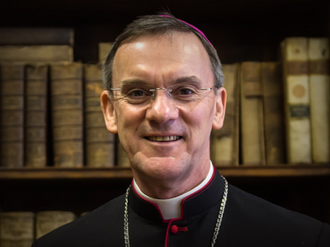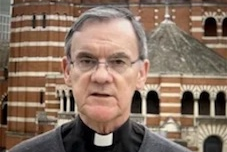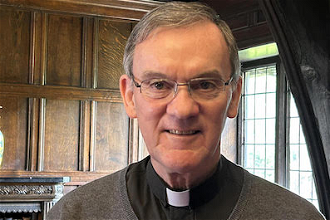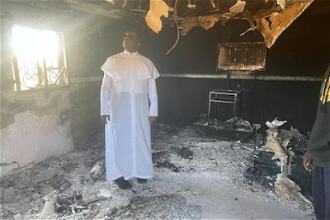Text: Bishop John Arnold reflects on Missionary Discipleship in address to Catenians

Bishop John Arnold quoted from the teaching documents of Pope Francis in his address the Catenian Conference in Telford last Friday.
Reflecting on the ways all Christians are called to live out their vocations, Bishop John praised the Holy Father, saying: "I stand in awe of this pope. He seems to speak to each and every one of us in a personal and direct way. He introduced a style of ministry that I did not think was possible for a pope in my lifetime.
I have no doubt he knew what he was doing when he first put pen to paper.
In his letter Evangelii Gaudium, he knew what he was doing and he knew his vision for the Church. We have to reach out to the poor. We must never forget them. Right at the heart of the document is you, every one of you is a missionary disciple. We can't just leave it to the priests and nuns and missionaries. The mission of the Church is much wider than that. It impacts on all of us.
We've got to sort ourselves out and be the Church in our modern world. Within our parishes we've got to make sure that we're passing faith on well, that we're looking after members of our community, that we've got friendship within, that we're strong because of our association with one another. But we have got to look out from our parish communities. The mission of the church is out there.
Then he goes on to produce Laudato si. And we think he is going to say something about the environment. Well, yes he did, but he said so much more. He links everything together. It's not just about the environment and climate change, it's about our common home, and everything that makes that good: the creatures within it, the resources that we have. It gets down even to the cities that we build for one another to live in and the conditions that we make for one another and the care that we must have, particularly for the poor and the marginalised. So we're missionary disciples and that's the missionary territory that we've got.
Then he goes on to Amoris Laetitia. And everyone told us it's going to be about marriage and remarriage and breakdown of marriage. No, it's not, there are a couple of paragraphs on that. It's about relationships, the joy of love, in whatever form it is, whether it's looking after children, or looking after the elderly, or helping that sense of the maturing of a relationship that may go to marriage, but also, when marriage breaks down. It's about the whole lot, because he will not allow anybody to be excluded. The message is: everybody's welcome to listen to this message and take part, and all of us are involved, because we're all missionary disciples.
So, we've got our world in which we live, we've got our place as missionaries, we've got that question that we're never alone, we're engaged in various relationships of one kind or another, and we're to cherish those relationships because that's where the power of love builds and grows.
And then he comes out with this most recent letter, Gaudete et Exsultate: rejoice and be glad.
Because this, ladies and gentlemen, is how we do this. If we're going to be missionary disciples we need to get that fuel and that strength to do it and this is how we do it, by holiness: an individual attention to being holy. And he tells us how to do it and what to avoid, and how to see ourselves. He says: "Don't worry about being Mother Teresa of Calcutta or Francis of Assisi, that's for particular people at particular times, and remember, saints didn't get it all right either. Don't worry about the big drama of things, let's worry about the details, attending to those decisions and opportunities of every day, where we can be missionary disciples.
I think those four documents are quite extraordinary. Standing together, they give us a way of seeing our vocation.
Read the full text of Bishop John Arnold's address here:
Thank you very much for the invitation to be here. In fact, this conference falls between some important days for me, between Ascension and Pentecost. They've become more and more important to me, the longer I am ordained and the more I try to think about faith and the consequences of faith, and I'd like to think that's something to do with my understanding of the disciples.
And we know we're in deep trouble because just a bit further down the line, still in Chapter 4, verses 33-34,it says: 'Jesus would only teach the crowds in parables, so far as they were capable of understanding them.' It then says: 'He would take the disciples on one side, and explain to them everything He'd been saying to the crowds.'
They're not keeping up; they are remedial students, needing extra tuition. And it gets worse, right through the Gospel reading. I was amazed by it; I couldn't understand why I hadn't seen this before. Three times Jesus has to tell the disciples that he will be betrayed, he will be put to death and he will rise again. They're not listening. On the second occasion they're arguing about who's the most important among them. On the third occasion, as soon as he said that, John and James came up and said: "Can we be on your right and your left in your kingdom?" They'd missed the point.
And when they get to that point of being able to show their allegiance and their friendship and their love for Jesus at the arrest, they all run away, every last one of them. One's betrayed Him; another, the leader of the disciples, is about to deny knowledge of Him. Three times. Thanks, Peter.
So they're a bit of a disaster. And I like to stand with the disciples, in these days following the Ascension. What do you think the disciples would want to be saying at this moment? Well, we were with Jesus for three years; we listened to His teachings, we saw those wonderful, exciting miracles. It was great. And we followed Him, and of course He was the decision maker, He was the teacher, He was the guide, He made all the decisions, we just had to listen and follow.
I think for far too long we have had a misconception about the sturdy characters and close companions of Jesus who were the first generation of the Church. And that's always confirmed by those baroque statues standing in St Peter's Square and you've got that array of magnificent, sturdy, confident characters who are the leaders of the Church.
And then I read St Mark's Gospel. If you look critically at that text, the disciples in Mark's Gospel are, at best, disappointing; at worst, they're rubbish.
I'll give you a couple of examples. When Jesus begins to teach the disciples, it's the beginning of Chapter 4, and the first parable he teaches is the parable of the sower and there are great crowds there, taking it all in, great, they go away, and the disciples come and say: "What was the meaning of that parable?" And Jesus said: "Did you not understand that parable? How are you going to understand any of the parables?", implying: "That's the easy one fellas, there are 42 more where thatcame from!"
We didn't understand everythingHe was saying, but we were safe. We stayed with Him. He was doing all the work. And then, finally, He brought us up to Jerusalem, and that was magnificent because we got a great welcome. And we thought that really just one exciting, dramatic miracle in the temple would have been enough to persuade the most skeptical, hard-nosed and critical Pharisees and Sadducees that yes, Jesus isthe Son of God.
It was all going to happen, it was a great week, we thought, and then we get to Friday evening, and we're in total shock, because everything we thought was going to happen can't happen now: He's dead. He's been crucified, and we're in shock, we're bewildered, we're confused, because if He's dead, was He even the Son of Man? Surely that couldn't have happened to Him? Was He lying to us? Surely not, He was such a good and honest man. We don't know! We're bewildered, we're confused. Can you imagine what that 48 to 72 hours was like? Where do we go? What do we do? We're going to be hunted down as criminals. Everything we've been doing for the last three years has been a complete waste of time.
And then they hear that the body's been stolen and word's got out that the disciples have stolen the body and that's a serious crime. We can't even go home now. We're going tobe hunted down as criminals. And then there's that moment when all that shock goes into reverse, because He's back, and they don't quite know how. They saw Him there, He's dead, then He's walked into the room and said: "Peace be with you."
There's that lovely phrase in Mark's Gospel where, having said: "Peace be with you," He reproaches them for their obstinacy and incredulity. I love that phrase. It's not really one the disciples would have wanted to hear, and it's not the best school report, is it? But Jesus has come back, and all that shock and horror and loss is thrown into reverse.
So what we get for the next 40 days or so, we get Jesus teaching them, reassuring them, saying: "I told you this was going to happen. This is all part of the story, you weren't listening."
Well we were listening now, every last word, we weren't going to miss a thing; He's back with us. And that's the great thing: He is back with us. He's standing with us, He's takingthe decisions, He's teaching us again, He's guiding us, He's telling us what to do. We're alright now, we'll be listening to every last word. And then, yesterday, He said He was going. Going back to the Father, He said. And then He gave us this ridiculous mission. He said: "Go out to the whole world and proclaim the Good News."
Oh come on, get real Jesus, we've been listening to you, we've been learning what we can, we've not made a single decision in the last three years because you've told us what to do, and you're now telling us to go out to the whole world. We haven't been more than 30 or 40 miles from our homes in those last three years. We've been wandering around, we speak Aramaic and we can't even write it down, and we've got a whole empire out there, where they speak Latin and Greek. What are we going to do? You're telling us that we've to go out to the whole world. And He said: "Yes, but, I'm going to give you the advocate, and he'll remind you of everything I've said to you and he'll lead you in all truth."
And then He went. Well we're sitting around now, we don't know quite what to do. When's this guy coming? Will we know him when he gets here?
Will he introduce himself? Advocate? Hope he's not a lawyer... And will he give us a book of instructions? We couldn't read it anyway. What is going to happen to us? We've been left. A promise from Him: I will be with you always. Well, where is He? We are lost.
Then comes the moment of Pentecost. Something quite inexplicable, but they know the first step. They know they've got to get out there and get started. And it doesn't matter about a great scheme of things, a great plan, but let's take it step by step.
And we know, through 2,000 years of history, starting with them, guided by the Spirit, great things have happened. The project has been put in place, by the advocate, the Holy Spirit, working through trusting individuals.
Now that series of events has become very important to me, because, the more I think about it, the more I don't see a great scheme of things, and for those of you who are familiar with the diocese of Salford, I just happened to arrive there at a time when there was a need for decisions and change and restructuring. I hadn't got a clue what to do. But step by step, I hope, we're moving in the right direction. And I won't say that I haven't made mistakes in the three years that I've been there, but the general drift, I hope, is right.
Because we're living in a changing church in a fast-changing world. And Jesus is saying to us: "Go out to the whole world and proclaim the Good News." We can't get away from it. That's part of the baptismal promises. So what are we going to do, faced with that sort of mission? Well, fortunately, we've got Pope Francis, haven't we? I stand in awe of this pope. He seems to speak to each and every one of us in a personal and direct way.
He introduced a style of ministry that I did not think was possible for a pope in my lifetime. I have no doubt he knew what he was doing when he first put pen to paper. In his letter Evangelii Gaudium, he knew what he was doing and he knew his vision for the Church. We have to reach out to the poor. We must never forget them. Right at the heart of the document is you, every one of you is a missionary disciple. We can't just leave it to the priests and nuns and missionaries. The mission of the Church is much wider than that. It impacts on all of us.
We've got to sort ourselves out and be the Church in our modern world. Within our parishes we've got to make sure that we're passing faith on well, that we're looking after members of our community, that we've got friendship within, that we're strong because of our association with one another. But we have got to look out from our parish communities. The mission of the church is out there. Then he goes on to produce Laudato si. And we think he is going to say something about the environment. Well, yes he did, but he said so much more. He links everything together. It's not just about the environment and climate change, it's about our common home, and everything that makes that good: the creatures within it, the resources that we have. It gets down even to the cities that we build for one another to live in and the conditions that we make for one another and the care that we must have, particularly for the poor and the marginalised. So we're missionary disciples and that's the missionary territory that we've got.
Then he goes on to Amoris Laetitia. And everyone told us it's going to be about marriage and remarriage and breakdown of marriage. No, it's not, there are a couple of paragraphs on that. It's about relationships, the joy of love, in whatever form it is, whether it's looking after children, or looking after the elderly, or helping that sense of the maturing of a relationship that may go to marriage, but also, when marriage breaks down. It's about
the whole lot, because he will not allow anybody to be excluded. The message is: everybody's welcome to listen to this message and take part, and all of us are involved, because we're all missionary disciples.
So, we've got our world in which we live, we've got our place as missionaries, we've got that question that we're never alone, we're engaged in various relationships of one kind or another, and we're to cherish those relationships because that's where the power of love builds and grows.
And then he comes out with this most recent letter, Gaudete et Exsultate: rejoice and be glad.
Because this, ladies and gentlemen, is how we do this. If we're going to be missionary disciples we need to get that fuel and that strength to do it and this is how we do it, by holiness: an individual attention to being holy. And he tells us how to do it and what to avoid, and how to see ourselves. He says: "Don't worry about being Mother Teresa of Calcutta or Francis of Assisi, that's for particular people at particular times, and remember, saints didn't get it all right either. Don't worry aboutthe big drama of things, let's worry about the details, attending to those decisions and opportunities of every day, where we can be missionary disciples.
I think those four documents are quite extraordinary. Standing together, they give us a way of seeing our vocation.
Blessed John Henry Newman, whose many writings, many, many volumes, I don't understand too well, they're really quite complex; his language is Victorian. I once went to a church service where an actor delivered one of his most noted sermons word by word. He got up in the pulpit, and he delivered it, magnificently, and I don't think I understood too much of it at all!
But there is that one beautiful passage, that I treasure greatly, of Newman's writings, and it's the Meditation that begins: 'God has created me for some definite purpose. He's committed some work to me he's not committed to another. I have my mission.' That's for each of us to cherish. 'I have my mission.' I'm a missionary disciple. I'm in a world where we must love the place asour common home, and I'm in relationships with many people,and I can bring God into all those relationships.
Look at the Catenian Association. Has it got the sort of mission that it needs in the 21st century? Those characters who came together as the first Catenians, had a charism. That charism is still there. But it doesn't mean that the interpretation of that charism can't change, that we can't be looking at ourselves in a slightly different way because we are now in the 21st century, and we are missionary disciples.
I certainly understand the strength within your Association, and I praise you for all that you achieve in your Circles, for one another, in that sense of faith, family and friends.
I also applaud you for those visions of mission you do have out there: your public speaking competitions, involvement with youth, the role of Flame. Should there be a more identifiable missional statement?
It's up to you. I'm not here to dictate, but just to suggest. In the light of what Pope Francis says and does, is this the time when we have to re-interpret, or reconfirm what we are, what we're about and what we're trying to be?
I have to leave it to you.
There's also that question of welcome. Pope Francis welcomes everybody. "Who am I to judge?" he says. He wants everyone to come and understand the Catholic church, and either they want to accept it, or they say it's not for them and they move on, but let's give them the very best look at the Catholic church that we can. And I wonder what that says, and again, I'm not suggesting anything in concrete, but what should that say about the welcome we give and even the membership that we offer.
Perhaps we've got to be more open. If the Catenians is, as I truly believe it to be, a Catholic association with Catholic ethos and Catholic spirituality, I don't think you have any problem if you have people coming in who are not Catholics, because they're there because they want to find out more.
They want to know what we're about and we have got so much good news. And we've got to make sure that we're radiating it out.
I very much appreciate being here. Please, look at yourselves critically but positively, because there is such a wealth of goodness here, and we've got to make sure that each one of us is a missionary disciple, and that we're living in a world which is our common home, and we've got a great deal of good to say.
Thank you.





















